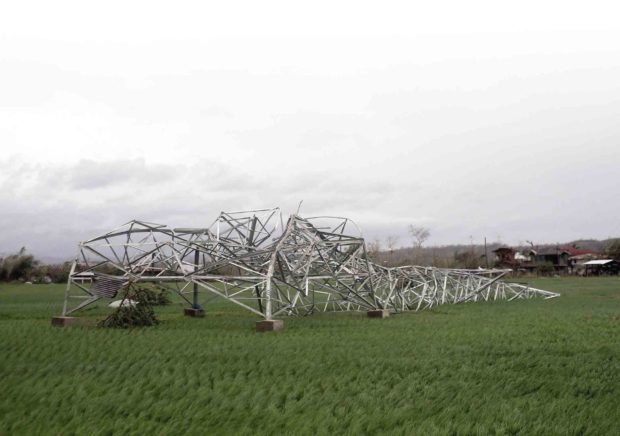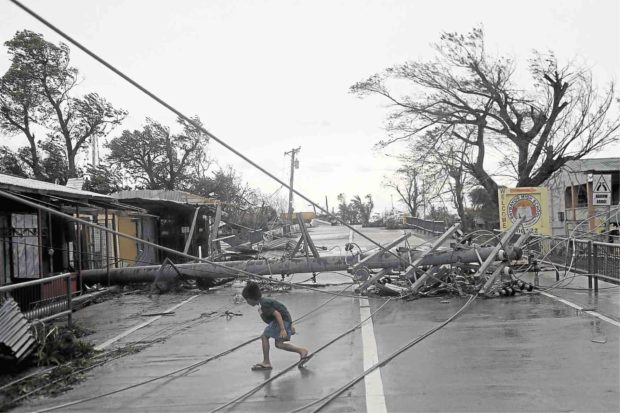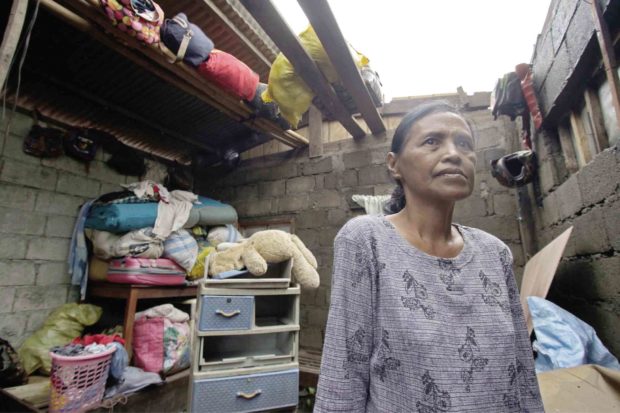Typhoon shuts power, roads in 8 provinces
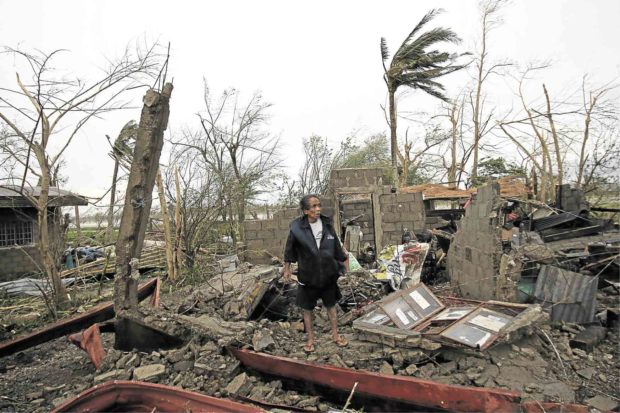
ALL GONE OVERNIGHT Jose Penikula scans the bleak landscape on Saturday after losing his house to ferocious winds unleashed by Typhoon “Ompong” in Alcala town, Cagayan province. RICHARD A. REYES
Government disaster-relief officials were assessing damage and checking on the conditions of millions of people in worst-hit provinces on Saturday after Typhoon “Ompong” (international name: Mangkhut) smashed through north and northeastern Luzon, leaving a large swathe of destruction and shutting down electricity in at least eight provinces.
At least 12 people, including two rescuers trying to free people trapped in a landslide in Baguio City, were confirmed to have died and two others were missing in the strongest typhoon to hit the country this year.
The massive storm’s blinding rain and ferocious wind gusts of up to 305 kilometers per hour toppled major power lines and caused widespread flooding, most notably in Baguio City and Cagayan province, which Ompong pummeled as it made landfall in Baggao town around 1:40 a.m. on Saturday.
As of 8 p.m. on Saturday, the Philippine Atmospheric, Geophysical and Astronomical Services Administration (Pagasa) said Ompong had slightly weakened and was tracked at least 240 km west-northwest of Laoag City, Ilocos Norte, moving across the West Philippine Sea toward Hong Kong.
‘Continuing hazards’
After hitting land as a supertyphoon with 220 kilometers per hour sustained winds and slamming across the Sierra Made and Cordillera mountain ranges, Ompong’s winds slowed to 160 kph with gusts of 195 kph.
Though the typhoon was expected to exit the Philippine area of responsibility (PAR) on Sunday morning, Pagasa warned of “continuing hazards.”
Weathermen said the western coasts of northern and northeastern Luzon were at risk of storm surges of up to 3 meters that could be stirred by Ompong’s outer cloud bands and the enhanced southwest monsoon.
By Saturday night, only 22 areas remained under storm signal, all of which were in northern and central Luzon: Signal No. 3 in Ilocos Norte, Ilocos Sur, and La Union; No. 2 in Batanes, Cagayan, including the Babuyan Group of Islands, Abra, Apayao, Kalinga, Mountain Province, Ifugao, Benguet, Pangasinan, and Zambales; and No. 1 in Isabela, Nueva Vizcaya, Quirino, Tarlac, Pampanga, Bulacan, Nueva Ecija, Aurora and Bataan.
Storm warnings remained hoisted in 10 provinces as the typhoon, the 15th to hit the country this year, headed for open water.
A government damage assessment was underway, except in northwestern areas of Luzon that were stilll being battered by winds and blinding rain as of 8 p.m. on Saturday.
Two Air Force C-130 cargo planes and 10 helicopters were on standby at Villamor Air Base in Pasay City to help transport rescuers and aid supplies.
Ompong’s fierce winds put out of commission transmission and distribution lines in the provinces of Cagayan, Ilocos Norte, Ilocos Sur, Abra, Kalinga, Apayao, Mountain Province and Nueva Vizcaya, according to the National Grid Corp. of the Philippines (NGCP).
In a press briefing, NGCP assistant vice president Raul Seludo said 90 percent of Benguet province had no electricity.
Power lines tripped
The typhoon caused the tripping of 12 230-kilovolt transmission lines, 26 69-kv lines and one 23-kv line in all eight provinces, said Seludo, head of the NGCP’s systems operation in Luzon.
He said power outages were also experienced in Southern Luzon and the Visayas.
“We cannot say when full restoration will be achieved because we can’t send out our people while the weather is still bad,” said NGCP vice president Gildo Listano.
In Metro Manila, the Manila Electric Company (Meralco) said Ompong caused service interruptions that affected as many as 423,000 customer connections. As of 5 p.m. the said number of customers had been reduced to 63,000.
Landslides closed off several major road sections in northern Luzon to traffic on Saturday, the Department of Public Works and Highways (DPWH) reported.
Huge boulders, loosened soil and thick mud from a collapsed slope at Barangay Ambatec in Bayyo town, Bontoc province, rendered the Mountain Province-Nueva Vizcaya Road impassable to all types of vehicles.
Officials were also monitoring the condition of the Chico Karayan bridge, also in Bontoc, whose foundations were weakened by floodwaters rushing down mountain slopes on both banks of the Chico River.
Collapsed slopes
Collapsed slopes were also reported at the Beto and Supang sections of the Mountain Province-Ilocos Sur Road via Tue.
Several landslides were also reported at the Chakchakan, Gonogon, Malitep and Palinga-aw sections of the Baguio-Bontoc Road.
In Quirino, the swollen Ngilinan River forced the closure of the NRJ-Villa Sur-San Pedro-Cabua-an-Ysmael-Disimungal Road.
In Ilocos Sur, the Tagudin Cervantes Road was closed to traffic due to land and rock slides, while in Cagayan, the Itawes Overflow Bridge went underwater, rendering the Cagayan Apayao Road section in Sta. Barbara, Piat, impassable to all types of vehicles.
The National Disaster Risk Reduction and Management Council (NDRRMC) said that accumulated rains, compounded by the release of water from several dams, including Chico and San Roque dams in the Cordilleras, could continue to cause floods and trigger more landslides.
In an NDRRMC briefing at Camp Aguinaldo on Saturday, presidential spokesperson Harry Roque said two female “responders” died in landslides in Baguio City. Two other persons perished in the city (See related story on A4), police said.
An 8-month-old infant girl in Pio Duran town, Albay province, died on Thursday night after she fell through a hole in the bamboo floor of a flooded house.
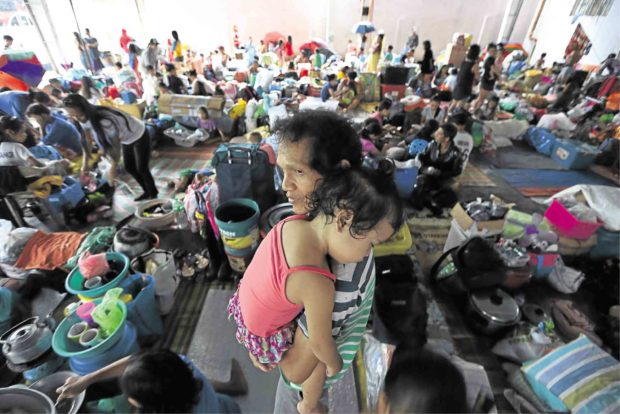
Away from the typhoon’s eye, in Rizal province, displaced families in San Mateo town pack an evacuation center in Barangay Banaba. —PHOTOS BY RICHARD A. REYES AND NIÑO JESUS ORBETA
Senior Supt. Benigno Durana, spokesperson for the Philippine National Police, told the briefing that rescuers fished out the body of a still unidentified girl from the Marikina River on Saturday morning.
Two residents in Itogon, Benguet, were reported missing.
Defense Secretary Delfin Lorenzana and Office of Civil Defense officials said rescuers in Cagayan were verifying the drowning of two children.
The provincial capital of Tuguegarao reeled from the onslaught of Ompong, which severely damaged the airport and public market, ripped apart roofs of hundreds of houses and uprooted trees, Transportation Secretary Arthur Tugade said.
President Rodrigo Duterte designated Tugade as head of his Cabinet’s relief and rescue monitoring group for Cagayan.
In all, about 105,000 people were staying in relief centers and other temporary shelters from Ilocos Norte to provinces in Southern Tagalog as of Saturday night, according to social welfare and NDRRMC officials.
A report from the regional Disaster Risk Reduction Management Office said a total of 9,025 people from 2,814 families had already sought shelter in relief centers in the provinces of Cavite, Laguna, Batangas, Rizal and Quezon.
In Mindoro, Marinduque, Romblon and Palawan, 457 evacuation centers were activated to accommodate a total of 4,941 evacuees, said police Supt. Imelda Tolentino, the region’s police information officer.
Nine members of the Geron family literally hung on for dear life inside their house in Barangay San Jose when Ompong hit land at the coastal town of Baggao before 1:40 a.m.
Five men in the family pulled at ropes tied to the house’s trusses for several anxious minutes as the typhoon’s winds tugged at the roof.
“They were hanging down from the roof while I and my three children prayed,” said Danly Geron, 39.
With a 50-km eyewall, Ompong powered through the Baggao coastline, crossed the Sierra Madre mountain range and slammed into the Cagayan towns of Gattaran and Lasam.
The typhoon flattened huts, toppled trees and electric posts and pried off galvanized iron sheets like pieces of paper in Baggao and the nearby towns of Alcala, Amulung, Gattaran and Lal-lo.
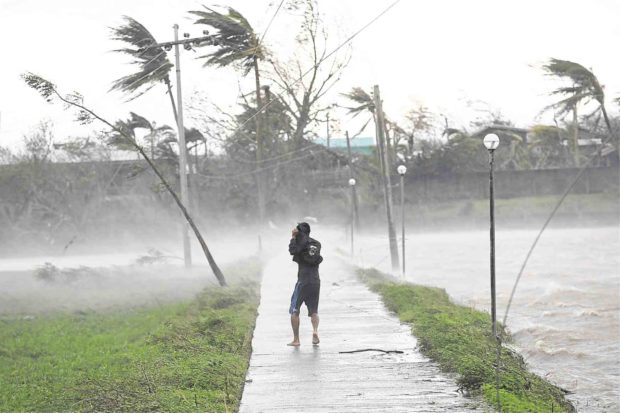
OMPONG’S FURY Typhoon “Ompong” (international name: Mangkhut) pounds Cagayan province on Saturday as it moves toward the West Philippine Sea. In Amulung town, a man braves heavy rain and powerful wind while crossing a road in Barangay Baculud.
In Barangay Baybayog, Baggao, Richard Erpelo and his three children survived after fierce winds and rain blew away the roof and walls of their house.
“We rolled on the highway because of the strong winds. I wrapped my 5-year-old daughter and we rolled together,” Erpelo told the Inquirer at an evacuation center in the town.
More flights arriving and departing the four terminals of Ninoy Aquino International Airport (Naia) were called off despite Ompong’s expected exit from the PAR on Sunday night.
Canceled flights
The total of canceled flights from Friday to Monday climbed to 217—108 domestic and 109 international flights, according to the Manila International Airport Authority (MIAA).
Airline companies have advised MIAA that they would cancel a total of 62 more flights on Sunday and Monday.
Cebu Pacific and its budget carrier CebGo called off its remaining flights scheduled on Sunday and Monday.
Cathay Pacific canceled a total of 18 flights, Philippine Airlines 14, AirAsia 5, AirSwift 2 and Air China 1.
The Civil Aviation Authority of the Philippines issued a notice to airmen (Notam) calling on commercial airlines flying to and from airports in northern Luzon to secure a waiver from the Office of the Director General.
The Department of Foreign Affairs said it would deploy personnel in the country’s international airports to facilitate the provision of P5,000 in financial assistance to overseas Filipino workers whose flights were canceled because of Ompong.
The department has put up a help desk at Clark International Airport in Pampanga and will deploy teams starting on Sunday to terminals 1, 2 and 3 at Naia, Foreign Secretary Alan Peter Cayetano said. —With reports from Jovic Yee, Leila B. Salaverria, Jerome Aning, Dexter Cabalza, Maricar Cinco, Rey Anthony Ostria, Madonna Virola, Villamor Visaya Jr., Leilanie Adriano, Tonette Orejas, Gabriel Cardinoza, Yolanda Sotelo, Armand Galang and the wires
